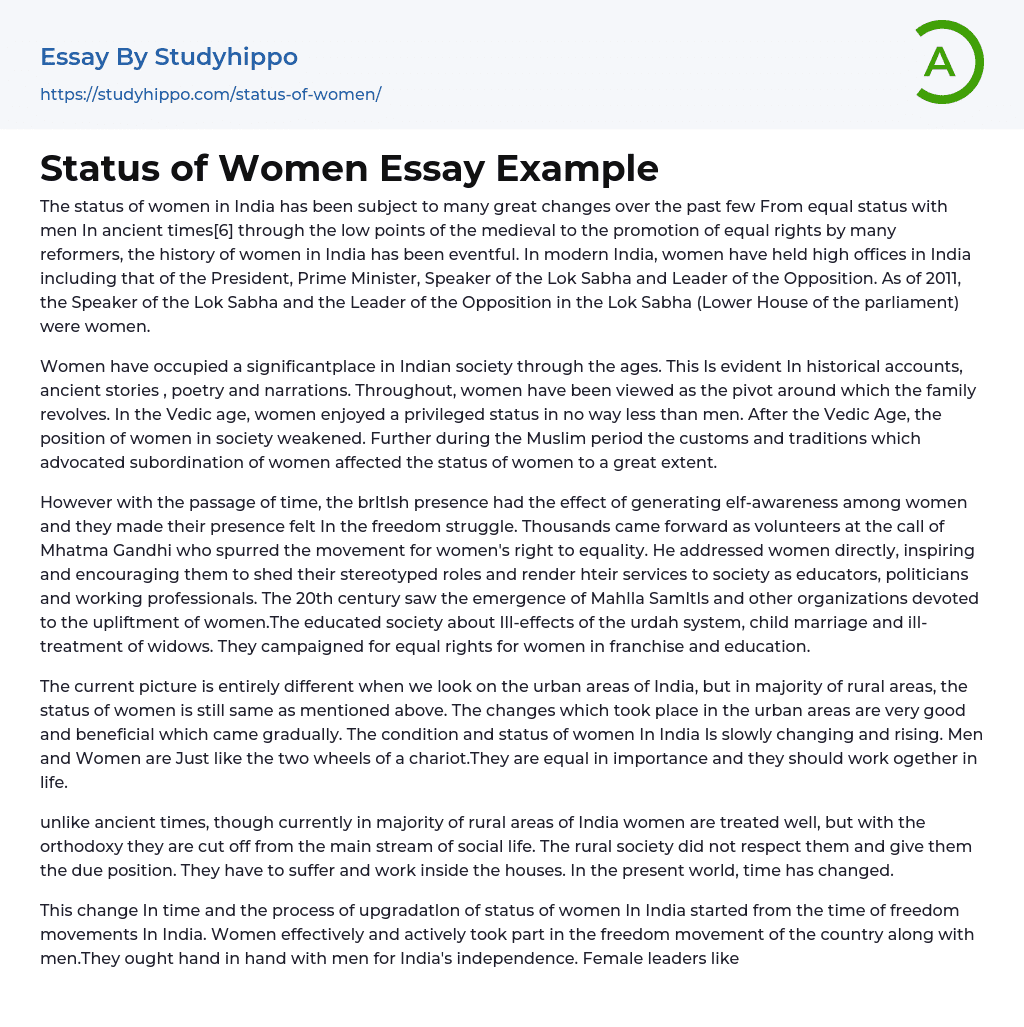The status of women in India has undergone significant changes throughout history. While they were previously viewed as equal to men in ancient times, their position deteriorated during the medieval era. Nonetheless, gender equality was advocated by several reformers who have left an indelible mark on Indian women's history. Today, women have held esteemed positions such as President, Prime Minister, Speaker of Lok Sabha and Leader of Opposition in modern-day India. Moreover, both the Speaker of Lok Sabha and Leader of Opposition were female as of 2011.
Women have played a crucial role in Indian society throughout history, as historical records, ancient stories, poems and narratives demonstrate. They were considered the foundation of families and had equal rights with men during the Vedic Age. However, their position declined in later periods, particularly during the Muslim era when traditional practices resulte
...d in significant marginalization.
Over time, the British presence sparked self-awareness among women, leading them to participate in the freedom struggle. Thousands of women responded to Mahatma Gandhi's call and volunteered, as he directly addressed and inspired them to break free from stereotyped roles and contribute to society as educators, politicians, and professionals. The 20th century witnessed the rise of organizations such as Mahila Samitis aimed at empowering women and educating society about issues like child marriage, ill-treatment of widows, and the negative impact of the purdah system. These groups advocated for equal rights in education and suffrage.
Although the situation for women in urban areas of India has greatly improved over time, the majority of rural areas still maintain the same status quo as before. The development in urban cities has been beneficial and positive. The condition and
position of women in India are gradually improving. It is important to recognize that men and women are like the two wheels of a chariot - both equally essential and should work in harmony together in life.
Despite improvements in the treatment of women in rural areas of India, they are still marginalized from the mainstream of social life due to orthodoxy. Historically, these women did not receive the respect and proper position they deserved from their rural society, and were forced to work and suffer within their homes. However, times have evolved in the present world.
The status of women in India was elevated during the nation's struggle for independence as women played a pivotal and contributory role alongside men. Female leaders, including Sarojini Naidu, Kasturba Gandhi, Lakshmi Bai, and others spoke up during this time and worked closely with their male counterparts to achieve India's liberation.
Women in India, irrespective of their social status, defied the purdah system and rejected confinement to domesticity. They proactively worked towards enhancing their position in society and showcased their potential that was on par with or even surpassed that of men.
Women in India enjoy full equality according to the constitution, which enables them to actively engage in social and political arenas. They hold various positions, including social work, medicine, science, engineering, law enforcement, judiciary as well as teaching and corporate jobs. Furthermore, women are surpassing men in multiple domains.
In India, women in All India Services are now competing with men and excelling academically. Their exceptional abilities have been demonstrated when given equal resources and opportunities. It is worth noting that India had a female Prime Minister who served for
an extended period of time, while the current President, Mrs. Pratibha Patil, is also a woman - making prominent women's names recognizable in India.
Sonia Gandhi has demonstrated her worldwide abilities and impact, securing a place on the list of Most Powerful Women in the World. Moreover, women from India have achieved excellence in various fields. For instance, Kalpana Chawla was the first Indian-American astronaut and woman to travel to space. Several other female athletes such as Mary Kom, Saina Nehwal, and Sania Mirza have brought pride to their country by actively participating in sports.
The progress of nations has been significantly advanced through the participation of women in sports, demonstrating their essential role. In India, education is critical to personal development and to promote female education, the constitution guarantees free primary education for girls until they are 14 years old. As Jawaharlal Nehru once expressed: "The state of a nation can be reflected by the condition of its women."
It is important to show women respect, provide them with encouragement, and treat them as equals.
- Sojourner Truth essays
- John Locke essays
- 9/11 essays
- A Good Teacher essays
- A Healthy Diet essays
- A Modest Proposal essays
- A&P essays
- Academic Achievement essays
- Achievement essays
- Achieving goals essays
- Admission essays
- Advantages And Disadvantages Of Internet essays
- Alcoholic drinks essays
- Ammonia essays
- Analytical essays
- Ancient Olympic Games essays
- APA essays
- Arabian Peninsula essays
- Argument essays
- Argumentative essays
- Art essays
- Atlantic Ocean essays
- Auto-ethnography essays
- Autobiography essays
- Ballad essays
- Batman essays
- Binge Eating essays
- Black Power Movement essays
- Blogger essays
- Body Mass Index essays
- Book I Want a Wife essays
- Boycott essays
- Breastfeeding essays
- Bulimia Nervosa essays
- Business essays
- Business Process essays
- Canterbury essays
- Carbonate essays
- Catalina de Erauso essays
- Cause and Effect essays
- Cesar Chavez essays
- Character Analysis essays
- Chemical Compound essays
- Chemical Element essays
- Chemical Substance essays
- Cherokee essays
- Cherry essays
- Childhood Obesity essays
- Chlorine essays
- Classification essays




